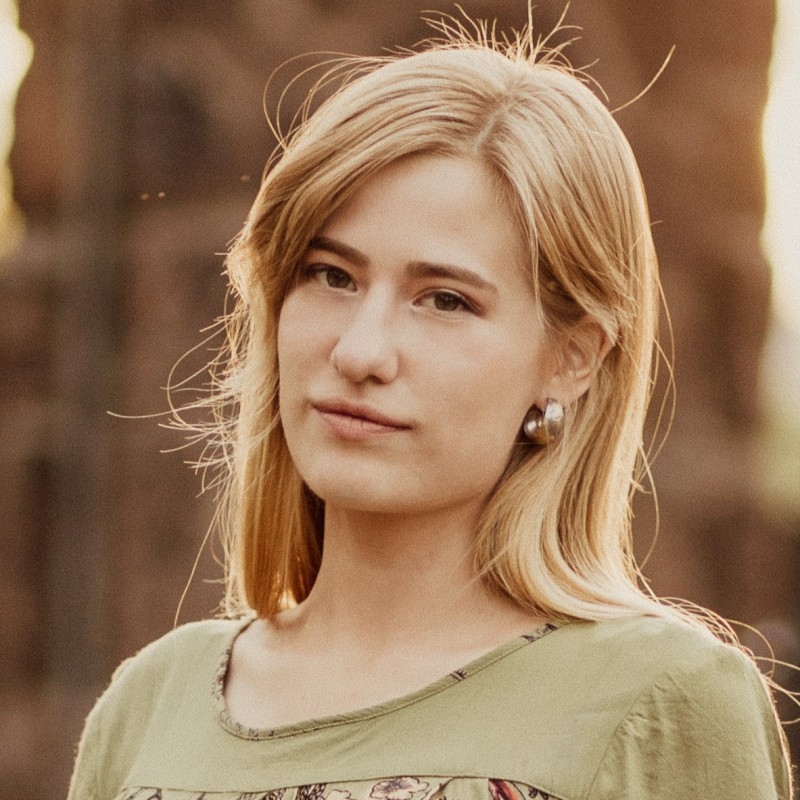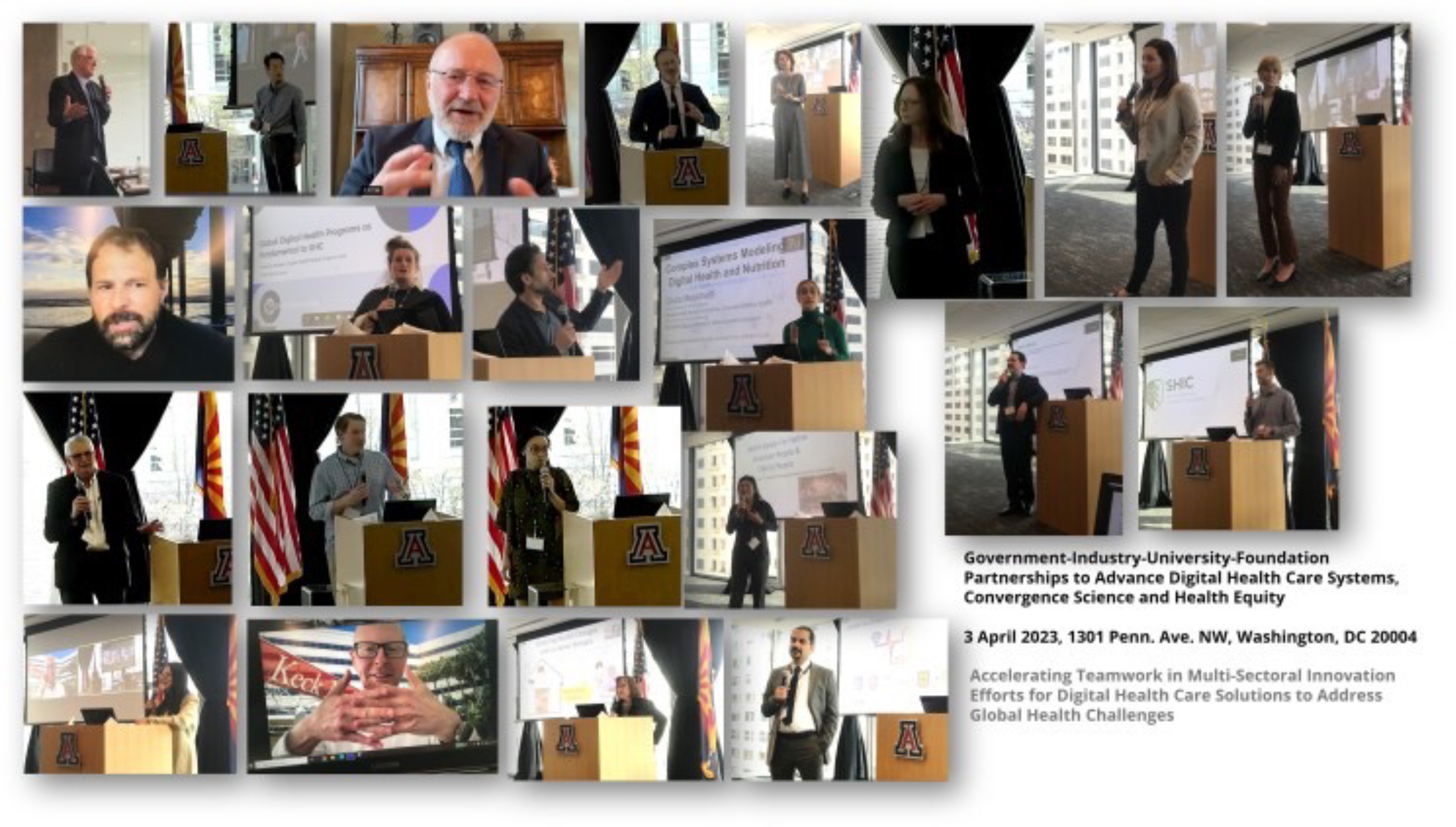by Emily Shoteen Allerton
On April 3, 2023, I had the honor of contributing to the C2SHiP (Center to Stream Healthcare in Place) annual conference on Government-Industry-University-Foundation Partnerships to Advance Digital Health Care Systems, Convergence Science, and Healthy Equity. Dr. John Paul SanGiovanni (C2SHiP, BIO5) hosted the event at The University of Arizona Washington, D.C. Center for Outreach and Collaboration..
 The conference featured experts from The National Academy of Medicine, the National Science Foundation, The World Bank, The Food and Drug Administration, the National Institutes of Health, embassies of Italy and Israel, private sector companies such as Briya, foundations and universities. The attendees discussed various topics such as advancements in digital health technology; data structures; decision science; genomics and metabolomics; nutraceutical research on medicinal plant compounds; the role of telehealth, the government and individual communities in promoting health equity; and the challenges faced in achieving that equity. The roundtable discussions and Q and A sessions provided a platform for experts from different sectors to share their perspectives and insights, leading to discussions and potential collaborations that could help advance the field of digital health technologies. As participants, we discussed ways to promote health equity and improve healthcare by utilizing the state-of-the-science and emerging technologies, such as artificial intelligence, digital therapeutics, and telemedicine.
The conference featured experts from The National Academy of Medicine, the National Science Foundation, The World Bank, The Food and Drug Administration, the National Institutes of Health, embassies of Italy and Israel, private sector companies such as Briya, foundations and universities. The attendees discussed various topics such as advancements in digital health technology; data structures; decision science; genomics and metabolomics; nutraceutical research on medicinal plant compounds; the role of telehealth, the government and individual communities in promoting health equity; and the challenges faced in achieving that equity. The roundtable discussions and Q and A sessions provided a platform for experts from different sectors to share their perspectives and insights, leading to discussions and potential collaborations that could help advance the field of digital health technologies. As participants, we discussed ways to promote health equity and improve healthcare by utilizing the state-of-the-science and emerging technologies, such as artificial intelligence, digital therapeutics, and telemedicine.
During the networking lunch I had the chance to meet some of my peers from my undergraduate research lab--it was lovely to be able to meet in person for the first time! Marelize Gorgens from The World Bank shared some of her experiences with us working in healthcare across the globe and of potential advancements. She spoke about the possibilities of using telehealth to address the shortage of providers in rural communities around the world currently being explored. She gave the example of how front-line community health care workers could act as a bridge between their home communities and higher-level providers through technology, using telehealth but still providing a human, face-to-face connection. I was intrigued by this concept as it could enable greater community empowerment while our communities are in the process of supporting more Indigenous physicians and healers in their training. I also had the pleasure of speaking with several industry leaders interested in collaborations for community health.
For the roundtable discussion “Health Equity for Native Peoples”, I had the pleasure of sharing the floor with Dr. Julie Smith-Yliniemi (Ojibwe/Anishinaabe), a professor and community leader in Indigenous Health from the University of North Dakota. Dr. Yliniemi spoke of her community work and the importance of culturally-adapted evidence-based trauma therapy. Dr. Yliniemi was also a student of the Center for Mind Body Medicine (I’m currently in training!), so it was wonderful to have that shared connection. During my presentation, I spoke about the importance of honoring the Indigenous origins of  healing practices in science and medicine. Highlighting the need for promoting traditional knowledge for health solutions to address the formidable physical and mental health challenges against which our communities are struggling, I shared how traditional healing practices focus on holistic approaches that can be confluent with integrative medicine, incorporating spiritual, mental, physical, communal, environmental, and ecological health--all vital factors in health and healing. Additionally, I discussed how mind-body medicine can be an actionable and culturally-congruent way to strengthen community health and cultural practices. I emphasized the need to empower leaders in their own communities: including, but not limited to Indigenous scientists, Indigenous elders and knowledge bearers, Indigenous physicians, and Indigenous healers.
healing practices in science and medicine. Highlighting the need for promoting traditional knowledge for health solutions to address the formidable physical and mental health challenges against which our communities are struggling, I shared how traditional healing practices focus on holistic approaches that can be confluent with integrative medicine, incorporating spiritual, mental, physical, communal, environmental, and ecological health--all vital factors in health and healing. Additionally, I discussed how mind-body medicine can be an actionable and culturally-congruent way to strengthen community health and cultural practices. I emphasized the need to empower leaders in their own communities: including, but not limited to Indigenous scientists, Indigenous elders and knowledge bearers, Indigenous physicians, and Indigenous healers.
Dr. Yliniemi and I discussed and answered questions highlighting the challenges faced by Indigenous communities in accessing healthcare and adequate nutrition, emphasizing the need for culturally appropriate healthcare services and traditional nutrition sources and practices that incorporate Indigenous knowledge and practices. This event provided the opportunity to share about the We Are Healers Community Circle who are currently supporting myself and a cohort of future Indigenous healthcare providers, working to address the fact that only around 0.5% of providers are Indigenous in the United States.
Indigenous knowledge is an ancient science that can provide wisdom and innovation in the areas in which Western medicine falls short. It was heartening to see many attendees recognize the importance of incorporating Indigenous knowledge in healthcare, as well as addressing the systems that result in health disparities. From the participants’receptiveness and careful attention to challenges that face us all, it’s my hope that our shared commitment to strengthening health equity for individual communities and the world will lead to new collaborations, positive advancements, and empowered healing for all.
A full list of speakers and topics can be found at: https://nutrientscience.org/wp-content/uploads/2023/04/Digital_Health_Co...

